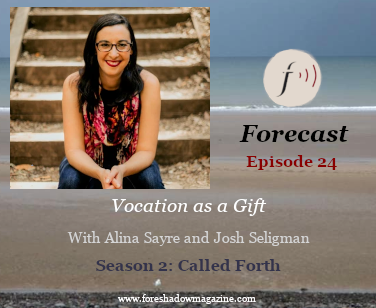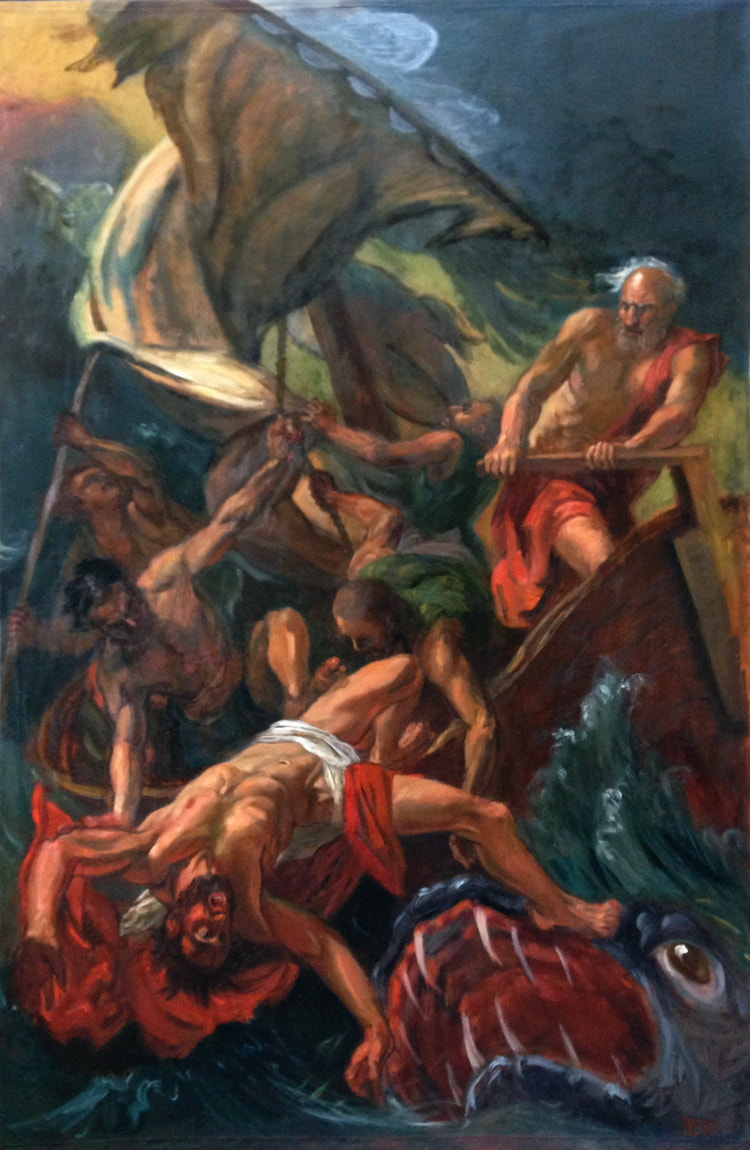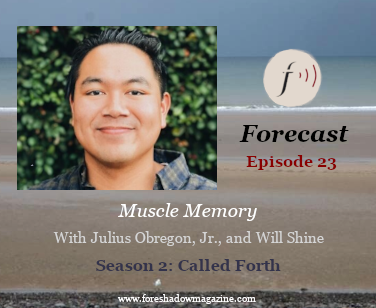|
After clicking 'Play', please wait a few moments for the podcast to load. You can also listen on Spotify, Apple, Google, Podomatic, Player FM and Deezer. Listen to other Forecasts here. Author and speaker Alina Sayre speaks with Josh about the intersection between her Christian faith and her writing. Although at one point, she wondered if creative writing distracted her from pursuing God, she now believes that God has given it to her as a gift to use and develop in various forms. Alina also describes her experience as a theopoetics student and then reads and discusses her new poem 'Sleepwalker', which is forthcoming on Foreshadow. Below are excerpts from today's Forecast. They have been lightly edited for clarity and concision. Loving God through writing I started my writing career by chewing on books. I was really interested in books from a very young age. I loved to read. It wasn't until late elementary school that I started getting interested in writing, as I started to realise how much power stories have to shape the way we think and the way we feel.... I was growing up in an evangelical church at the time, and I had a lot of trouble reconciling the idea that I might be gifted as writer -- I didn't have the language for it at the time -- even being called in a vocational sense as a writer. I had this limited theology that vocation meant being a pastor or being a missionary, and if God hadn't called me to an explicitly religious career, then writing certainly didn't count in some way. I actually wondered, could writing be a distraction from God or some form of idolatry that I was putting in front of God? It wasn't until high school that I started to come to grips with the idea that vocation could be more than a religious career...God had put this desire in me to write, this gift, and to follow it was the best thing I could do to follow God and honour him.... I think a lot of our theology comes from life experience, at least on some deep level, whether we admit it or not. I had this deep love of writing -- I couldn't deny that -- and also a deep love of God, and to try to reconcile those two things, I had to believe they either don't go together, and God created me with a gift that he doesn't want me to use -- which brings up terrible questions about the goodness and wisdom of such a God, which even in my adolescent years, I was unable to reconcile with what I saw as a good and positive gift -- or God had put that in me to do something with. I did draw inspiration from others who had followed, lives that weren't missionaries or pastors and who had done a lot of good with that...well known Christians who were authors. I guess I followed a similar pattern with a number of other theological queries over the years. Even in the tradition I was raised with, women were not allowed to have speaking parts in worship. I was raised to believe that as gospel truth, and it wasn't until later in life that I began to similarly ask, why would God give me a gift that involves words -- not that I love to be in stage in front of people -- but I do have things to say, and why would God have given me that without wanting me to use that? A calling vs a hobby I separate a vocation-based passion from a hobby in that a hobby is something you enjoy until it takes work. For instance, I really enjoy photography, but I never see myself becoming more than an amateur because if I were really to put in the labour required to become professional, it would no longer be fun anymore...writing for me is something I am still passionate about after I've put in the work. On mentors I would never have written any of the things that I have written without the input of so many mentors throughout the years. As an adolescent, I did speech and debate as my extracurricular. My speech coach at the time encouraged me to lean into the events where I would write my own material. She saw a spark in me and challenged me to go after that, and I think that encouraged me to take it a little more seriously and explore that. As a teen, you're figuring out who you are and what you're good at, and that was a good indicator for me.... As a teen, especially as I was sorting through this notion of being gifted at something that was not traditionally a religious path, I found myself returning to [The Lord of the Rings] as a model. Knowing that [J.R.R.] Tolkien had a Christian faith, who never to my knowledge wrote about it explicitly, I found myself spiritually encouraged and guided by the story of Frodo and the Rings of Power, this motif of the quest, the sacrifice that goes into this overarching mission, the friends who keep them going and the people who, long before him, paved the way for him to accomplish this quest. I asked myself, if I could be so spiritually encouraged and guided by this story that has little to no explicitly religious material in it, who's to say that my calling couldn't be something similar: to write something that comes out of me as a person of faith, whether or not that material is explicitly religious? I was inspired by Tolkien's faith stamping itself upon his writing without being didactic or in your face. Seeking God in different situations I find a lot of the time what I'm trying to do is learning to see God in different situations. I spend part of my time teaching and tutoring, and sometimes the students are frustrating and hilarious at other times, and I think learning to interact with them definitely challenges me to see God in all sorts of different people, especially people who try my patience and just force me to look at the world in different ways. They're hilarious little people, and that challenges me and makes me laugh. And I think sometimes the very mundane things also challenge me to be present in the act of loving God. I really love Barbara Brown Taylor's An Altar in the World, as she focuses on just the very physical, ordinary things as paths to appreciating and spending time with God. I just made a big move, and I'm spending a lot of time breaking down boxes and washing dishes, and I think that is an interesting way to view those tasks as a way not just to glorify God by doing them excellently, though I try to, but to use that as time to be with God and just be conscious and aware of God's presence in the moment as I'm breaking down another box. Alina Sayre is the award-winning author of five books and a graduate student of theopoetics at Bethany Theological Seminary. You can learn more about her work here. You can also read her poem 'Keeping Vigil', recently published on Foreshadow, here.
Josh Seligman is the founding editor of Foreshadow and a co-host of Forecast.
0 Comments
By Matthew J. Andrews Jonah Cast into the Sea by James Patrick Reid. Used with the artist's permission. After clicking 'Play', please wait a few moments for the poem to load. (after James Patrick Reid’s Jonah) Of course I doubted him: crazed man of dust blown in by the wind, waterlogged eyes, salt baked onto his skin, demanding penance in the name of a god foreign to my ears, telling stories dripping wet with madness. But he took my hand with surprising strength and guided my fingers down the length of his arm, to the wounds riddling him like pockmarks, those places where the grave’s teeth tore into the skin, and to the patches burned with the corrosive splash of sheol’s stomach, and as I imagined the pain his god had made him endure, he drew my eyes up to his and asked me: do you now believe? Matthew J. Andrews is a private investigator and writer from California. He is the author of the chapbook I Close My Eyes and I Almost Remember, and his work has appeared in Relief, Rust + Moth, Pithead Chapel and EcoTheo Review, among others. He can be contacted at matthewjandrews.com. James Patrick Reid is an artist and theologian. His website is sacredpaintings.org. Related work on Foreshadow:
- Foreword: The Sign of Jonah (Editorial by Josh Seligman, January 2022) - God Who Sent the Dove Sends the Hawk (Poetry by Susan Yanos, January 2021) After clicking 'Play', please wait a few moments for the podcast to load. You can also listen on Spotify, Apple, Google, Podomatic, Player FM and Deezer. Listen to other Forecasts here. Musician and vocational mentor Julius Obregon, Jr., speaks with Will about parallels between musicianship and the spiritual journey. For Julius, vocation involves all of our lives and is driven by love. Just because one is called doesn't mean automatic arrival at one's destination; excellence requires discipline and learning from others. Our longings shape us, Julius says, and we are called to conform our longings to their divine source. This episode includes a clip of Julius' music. Below are excerpts from today's Forecast. They have been lightly edited for clarity and concision. What we do in our daily life I had to really do a lot of work to connect a lot of that heady stuff to things like my heart and my body and what I do with my every day. What we love about the monastics is that they understand the integration between all of those parts. The focus on daily habits is an important part of embodying our vocation because we understand vocation to be more than being defined by those few and far between, grandiose moments when we might display character, or those heroic moments. Our character and vocation are best displayed and embodied in what we do in our every day life. The things that are habitual to us. The every day, small decisions that we make. My love of the thing itself The pursuit of vocation is that back and forth between the 'whoa' transcendence and the working it out in the immanent. And I love how you're connecting it to my guitar playing because I think my participation in music as a craft has resourced me a lot in understanding what discipleship is. I discovered such a deep love and curiosity for this thing. That's what fuelled my discipline...I do attribute a lot of my growth to my love of the thing itself. I need to learn under someone else I started by myself, and then I reached a certain point where I was like, there's so many things that I don't know, that I don't think I can take myself to, so I sought out a teacher. This is exactly an analogue of what my spiritual life is like, of following this longing and then getting to a point of where I can only go so far by myself. I need to learn under someone else who is maybe more initiated in this way, or who can help me know what kinds of questions I need to ask...It was a back and forth of me being given something and then me working it out to my limits until I was like, 'Help me.' But I think it was being around somebody who've had more time and communion with this thing called music, or this craft...Being with my teachers was important because it was an embodied way for me to observe and take in what it looks like to be further along in knowing and participating in this thing. Muscle memory In college, I was finding more and more of a disconnect: I don't think I can tap into, if high school was me running off the juices of the big transcendent experiences, those big emotional things aren't happening to me anymore. But liturgy is this thing that grounds you. I can always practise my scales. Sometimes it'll click and it'll help me, and sometimes it'll feel rote, but it keeps me tethered to this thing, and it's growing muscle memory in me. That's what liturgy and spiritual practices do...In monasteries, they gather together for morning prayer every day. And then that catapults them into the rest of their day, and they do their stuff, and they come back together for midday prayer. And that's not always feasible given our different schedules, but at the very least, [they're] coming together. There are many moments when I would show up to morning prayer, and I would feel like I wasn't getting anything from the scriptures, but to have words that I was able to pray, and to be able to lean upon that when I didn't have any language to offer up myself was kind of like scales. I don't have anything, I don't have anything to write, but I know that playing these things is...forming something good in me. Conforming but not erasing desire We are first and foremost loving creatures. Our daily habits and, broader than that, the cultural liturgies we participate in, are shaping what we desire. Desire does so much to move us. It's a primary driving factor to why we do what we do...It does take discernment [to figure out] where my deep longing meets the world's deep need...I think there's something of God in my desire to play music and write and tell stories. Whatever eternity looks like, it's communion with God here and after...I think it's like tuning a poorly tuned guitar. There's something beautiful in what music connects me to, but that longing can also take me to places where I'm inflicting violence on people because primarily what's driving me is a desire for myself. So I think there is some refining that happens. My desire for drawing out beauty and telling stories and playing music -- there is something good and true and beautiful in that, and there are ways that that can be expressed and malformed. In some ways, there is a conformity that happens, but it doesn't erase my particularity. By Alina Sayre Everything sharpens: red truck spiraling down parking ramps, orange silk daisies in the windowsill, pink zigzags on a black screen, signs of her vitality, mortality. Afternoon rays like a focusing lens: this is the sacred crossing, the thin place, the fluttering of the veil. We keep vigil. Alina Sayre is the award-winning author of five books and a graduate student of theopoetics at Bethany Theological Seminary, Indiana (USA).
'Keeping Vigil' originally appeared in Alina's book of poems, Fire by Night. More details on Fire by Night are available here. |
Categories
All
ForecastSupport UsArchives
July 2024
|



 RSS Feed
RSS Feed
